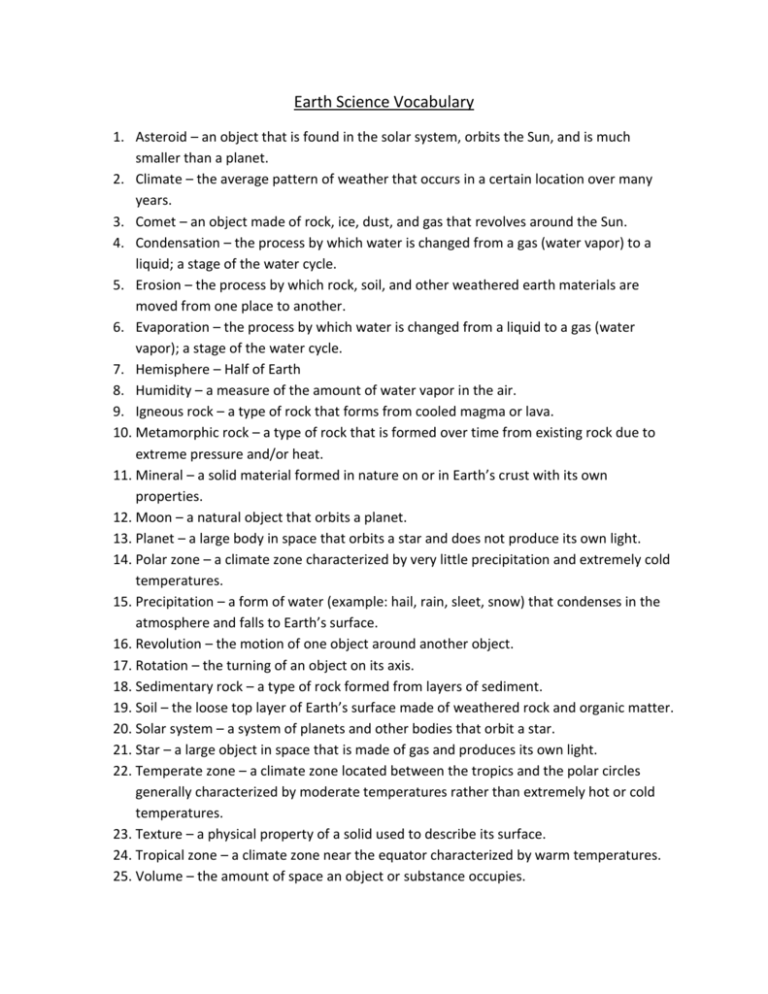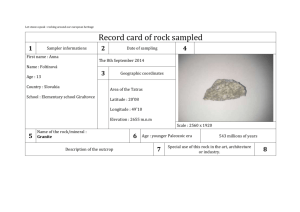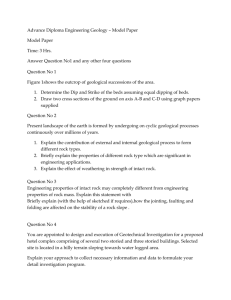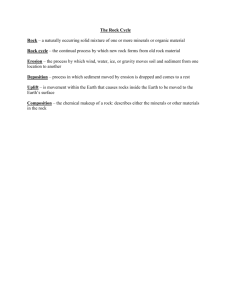Earth Science Vocabulary
advertisement

Earth Science Vocabulary 1. Asteroid – an object that is found in the solar system, orbits the Sun, and is much smaller than a planet. 2. Climate – the average pattern of weather that occurs in a certain location over many years. 3. Comet – an object made of rock, ice, dust, and gas that revolves around the Sun. 4. Condensation – the process by which water is changed from a gas (water vapor) to a liquid; a stage of the water cycle. 5. Erosion – the process by which rock, soil, and other weathered earth materials are moved from one place to another. 6. Evaporation – the process by which water is changed from a liquid to a gas (water vapor); a stage of the water cycle. 7. Hemisphere – Half of Earth 8. Humidity – a measure of the amount of water vapor in the air. 9. Igneous rock – a type of rock that forms from cooled magma or lava. 10. Metamorphic rock – a type of rock that is formed over time from existing rock due to extreme pressure and/or heat. 11. Mineral – a solid material formed in nature on or in Earth’s crust with its own properties. 12. Moon – a natural object that orbits a planet. 13. Planet – a large body in space that orbits a star and does not produce its own light. 14. Polar zone – a climate zone characterized by very little precipitation and extremely cold temperatures. 15. Precipitation – a form of water (example: hail, rain, sleet, snow) that condenses in the atmosphere and falls to Earth’s surface. 16. Revolution – the motion of one object around another object. 17. Rotation – the turning of an object on its axis. 18. Sedimentary rock – a type of rock formed from layers of sediment. 19. Soil – the loose top layer of Earth’s surface made of weathered rock and organic matter. 20. Solar system – a system of planets and other bodies that orbit a star. 21. Star – a large object in space that is made of gas and produces its own light. 22. Temperate zone – a climate zone located between the tropics and the polar circles generally characterized by moderate temperatures rather than extremely hot or cold temperatures. 23. Texture – a physical property of a solid used to describe its surface. 24. Tropical zone – a climate zone near the equator characterized by warm temperatures. 25. Volume – the amount of space an object or substance occupies. 26. Water cycle – the continuous movement of water through the environment by evaporation, condensation, precipitation, and runoff. 27. Water vapor – the gas state of water. 28. Weather – the condition of the atmosphere at a given time and place. 29. Weathering – the process by which rocks and other surfaces are broken down. All Sciences: 1. Analyze – to examine methodically by separating into parts and studying their interrelatedness. 2. Classify – to arrange in a specific order or group by categories based on similarities. 3. Conclusion – a statement that tells what an investigation showed, based on observations and data. 4. Control group – a group in a scientific experiment that serves as a reference for comparison to the experimental group (a group that is untreated by the factor being tested). 5. Data – measurements or observations collected and recorded in an experiment or investigation. 6. Experiment – a scientific test or procedure that is carried out under controlled conditions to answer a scientific question. 7. Inference – an explanation based on evidence that is not directly observed. 8. Investigation – an organized scientific study of the natural world that may include making systematic observations, asking questions, gathering information, analyzing data, summarizing results, drawing conclusions, and/or communicating results. 9. Observation – information about the natural world gathered through the sense and/or scientific instruments. 10. Predict – to state what one thinks will happen under certain conditions based on data or observation. 11. Technology – the use of scientific knowledge and processes to solve practical problems. 12. Testable (scientifically testable ) – a term used to describe a question that can be answered through an experiment or observation. 13. Trials – multiple sets of measurements or observations in a scientific investigation. 14. Valid – t term used to describe the certainty of data or results of an investigation or experiment. 15. Variable – an event, condition, or factor that can be changed or controlled in order to study or test a hypothesis in a scientific experiment.





